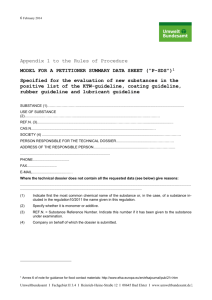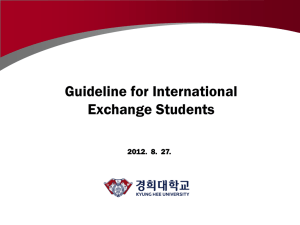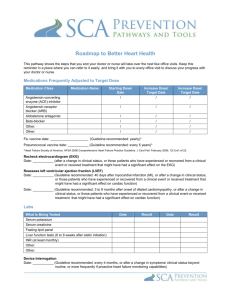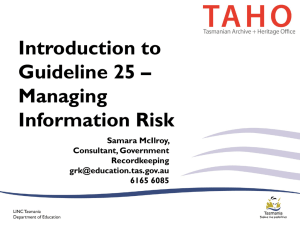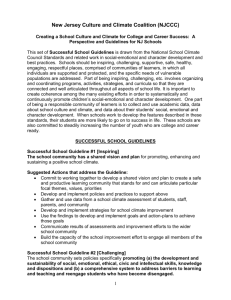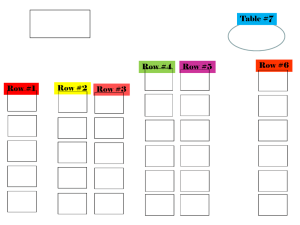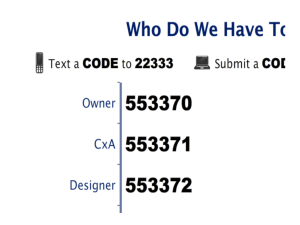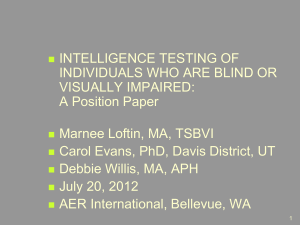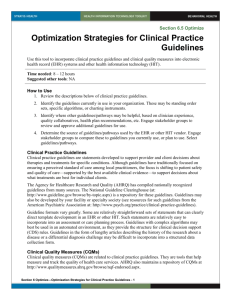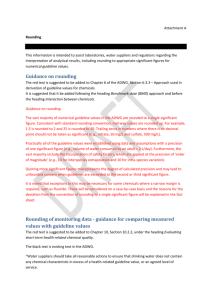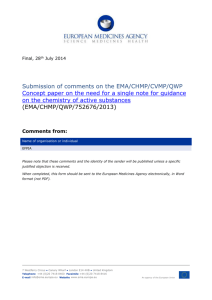Metin_Opt4MNH_Jun7_Ottawa_intro
advertisement
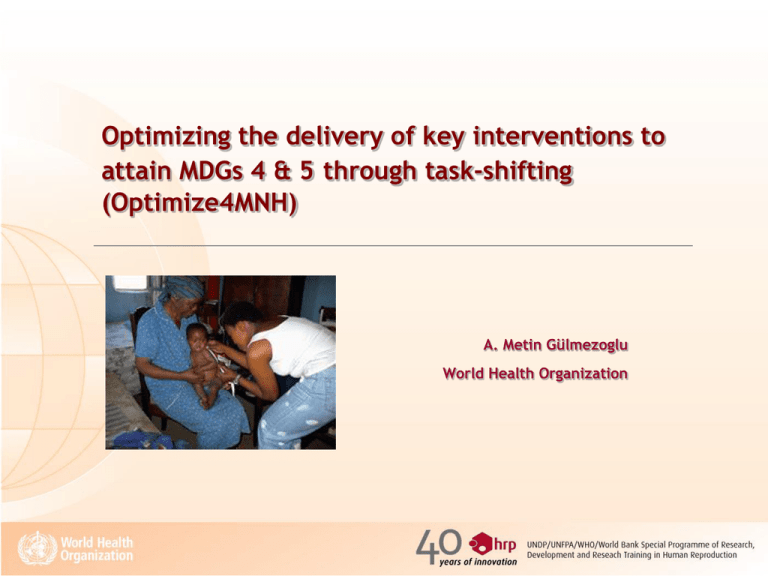
Optimizing the delivery of key interventions to attain MDGs 4 & 5 through task-shifting (Optimize4MNH) A. Metin Gülmezoglu World Health Organization Outline Background to the guideline WHO Guideline development standards Process to date 2 Optimizing the delivery of key interventions for MNH Current controversies in the field of maternal and newborn health where WHO guidance may be helpful – – – – – Misoprostol use by community health workers TBA training to improve maternal and newborn outcomes Nonphysician clinicians performing caesarean sections MgSO4 use by midwives Contraceptives by lay health workers Relevant publications and meetings World Health Organization (2010). Increasing access to health workers in remote and rural areas through improved retention. Global policy recommendations. Geneva, Switzerland: WHO. Available at http://www.who.int/hrh/retention/guidelines/en/index.html. World Health Organization (2008). Task shifting: rational redistribution of tasks among health workforce teams : global recommendations and guidelines. Geneva, Switzerland: WHO. Available at: http://www.who.int/hiv/topics/systems/health_workforce/en/ World Health Organization. (2008). International conference on task shifting (Addis Ababa Declaration 2008): Geneva, Switzerland: WHO. Available at http://www.who.int/healthsystems/task_shifting/Addis_Declaration_EN.pdf Bhutta, Z.A., Lassi, Z.S., Pariyo, G., & Huicho, L. (2010). Global experience of community health workers for delivery of health related millennium development goals: a systematic review, country case studies, and recommendations for integration into national health systems. Geneva, Switzerland: WHO & GHWA. Available at http://www.who.int/workforcealliance/knowledge/publications/alliance/Global_CHW_we b.pdf The WHO Guideline Development Standards WHO has internal regulations and standards for developing guidelines: WHO Handbook for guideline development WHO guideline review committee (GRC) monitors the guideline development process and ensures that the relevant regulations and standards are applied proposal content development technical unit GRC technical unit GRC final approval The Guideline Development Process the process includes: – (i) identification of priority questions and critical outcomes; – (ii) retrieval of the evidence; – (iii) assessment and synthesis of the evidence; • GRADE and DECIDE frameworks – (iv) formulation of recommendations; – (iv) planning for dissemination, implementation, impact evaluation and updating. Primary objective To identify and make recommendations on cadre(s) of workers who can increase access to effective practices in a safe way – In other words, we are interested in both task-shifting and expanding the roles of cadres to optimize access Chronology Mid-2010: Support secured to work on the guideline Late-2010: The WHO internal working group on the Opt4MNH guideline established December 2010: Guideline scoping meeting January 2011 to date: Evidence synthesis, quality assessment Mid 2010 to April 2012: Meeting within WHO WG every 3-4 months, two technical meetings on qualitative reviews 8 Scoping challenge: Going vertical or horizontal? Maternal •When •Who •What •Where Newborn Immunization HIV NCD Tb Others? 10 Guideline questions The focus of the recommendations is on cadre + intervention We are NOT addressing the questions at the system level We are NOT recommending the initiation or abolition of any cadre programme We are NOT comparing task shifting to a particular cadre with another type of intervention that organizes care in a different way (e.g. maternity waiting home) We are NOT addressing teams of cadres delivering interventions We are aware that asking the questions in this way does not address the whole problem particularly for national policy-making but, that was the only practical way we could see and agreed upon at the scoping meeting! 11 Guideline Steering Group WHO internal working group Health Systems / Human Resources for Health – – Carmen Dolea Annette Mwansa Nkowane HIV/AIDS Maternal Newborn, Child and Adolescent Health – – – – – Eyerusalem Kebede Negussie Rajiv Bahl Blerta Maliqi Matthews Mathai Annie Portela Qualitative reviews group – – – – – – Luz Maria De-Regil Juan Pablo Pena-Rosas João Paulo Dias De Souza Mario Festin A. Metin Gülmezoglu Mario Merialdi Lale Say Interns (Stephanie Polus, Watananirun Kanokwaroon, Joshua Vogel, Fabiola Stollar) Cathy Kiener Claire Glenton Simon Lewin Sarah Rosenbaum Jenny Moberg Unni Gopinathan Elin S Nilsen Jane Noyes Chris Colvin and the SA team Arash Rashidian and the Iran team Chris Morgan Neil Pakenham-Walsh Onikepe Owolabi Effect reviews – – – – – – Rajesh Khanna Zohra Lassi Olufemi Oladapo Stephanie Polus Watananirun Kanokwaroon Priya Miriyam Lerberg Alliance for Health Systems and Policy Research – – – – – – – – Reproductive Health and Research – – – – – – – – Norwegian Knowledge Centre Nutrition – – Technical working group Taghreed Adam Nhan Tran Global Health Workforce Alliance – George Pariyo 12 Thanks 13
